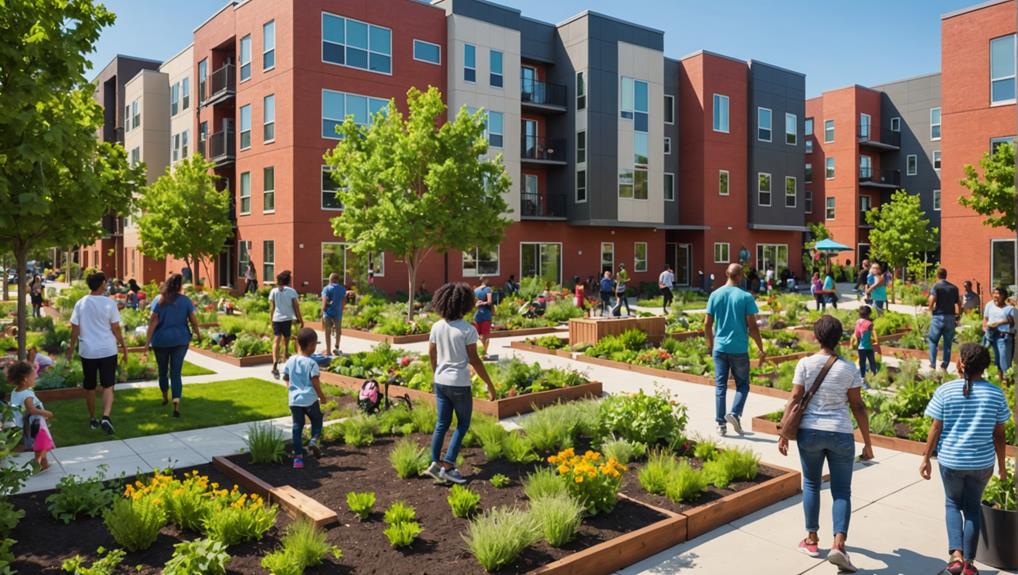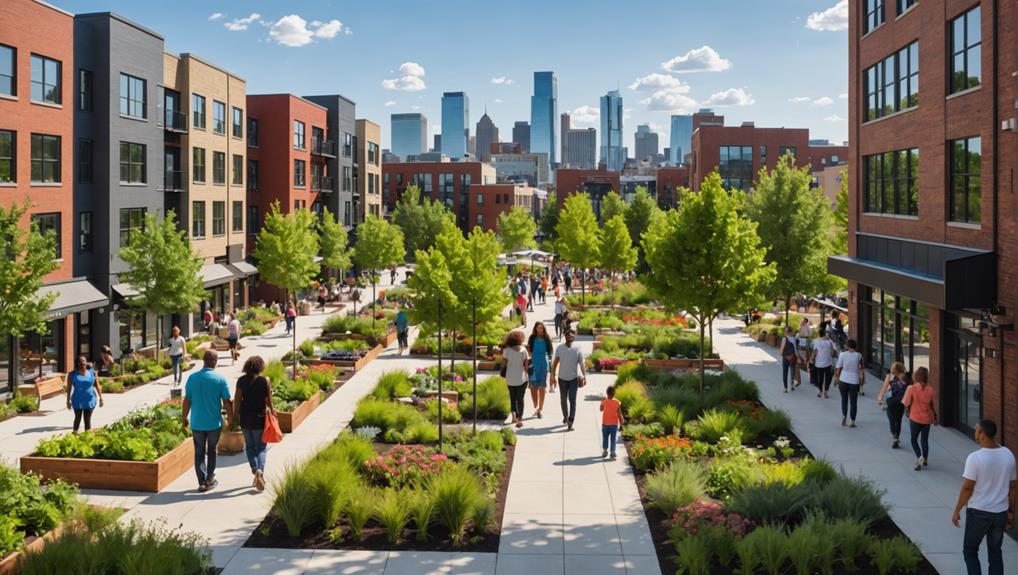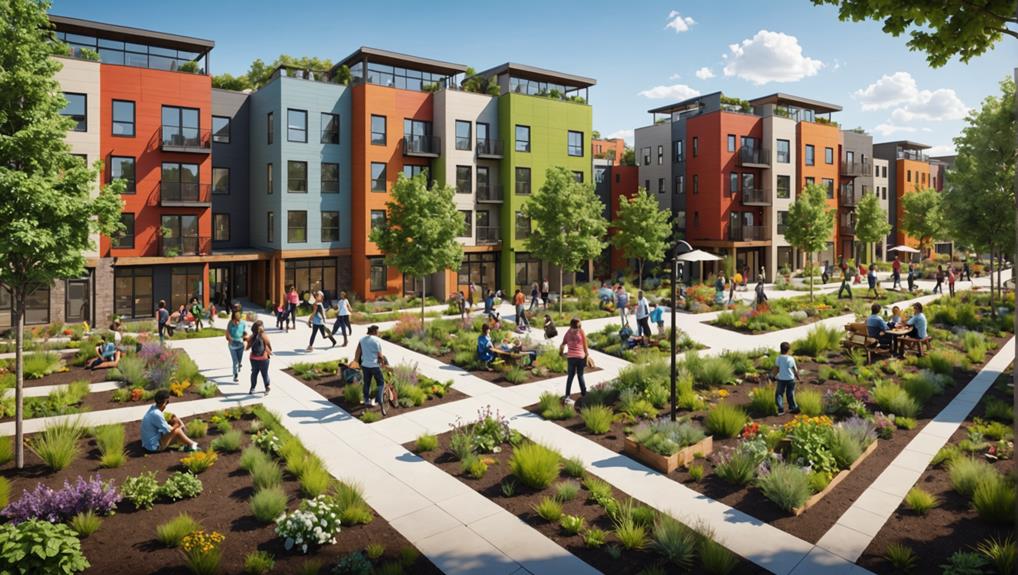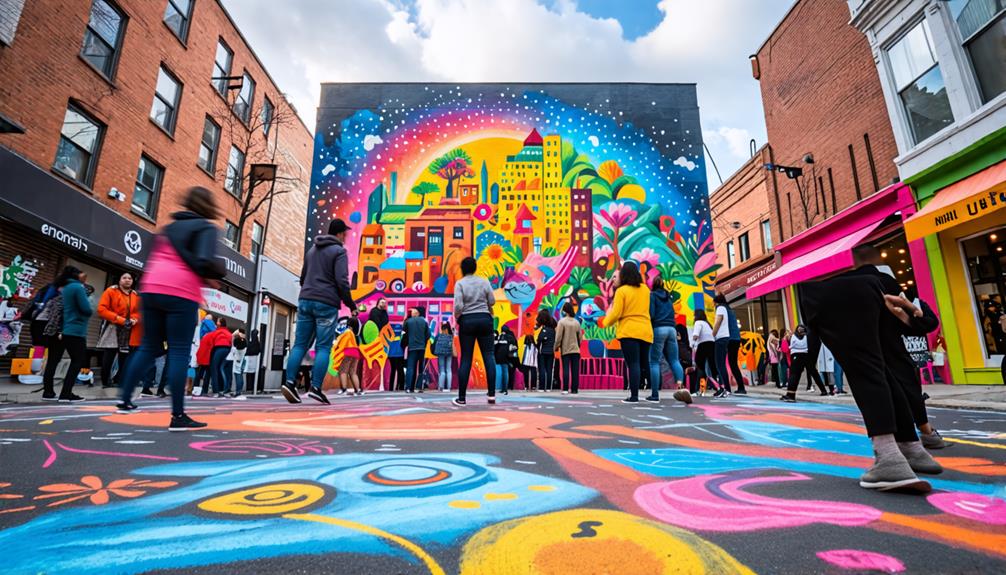
The Aspire Program, established under New Jersey's Economic Recovery Act of 2020, greatly boosts affordable housing across various cities. By addressing financing gaps and offering tax credits for mixed-use, transit-oriented projects, it prioritizes developments that enhance inclusivity and urban revitalization. Funded projects have created 728 housing units, with over 80% designated as affordable. In addition to stimulating local economies through job creation, these projects foster community growth and improved living conditions. The program's adaptable framework allows for tailored solutions to specific housing needs, positioning it as a model for future initiatives across different regions. Insights into its broader implications await further exploration.
Aspire Program Objectives

The Aspire Program, established under the New Jersey Economic Recovery Act of 2020, is a strategic initiative designed to address critical financing gaps in real estate developments, particularly in underserved communities. The program aims to facilitate urban revitalization by leveraging program funding through tax credits to stimulate investment in mixed-use, transit-oriented projects. By prioritizing developments that include affordable housing, the Aspire Program seeks to create vibrant, inclusive neighborhoods that meet the needs of diverse populations. This initiative not only emphasizes the importance of housing stability but also intends to foster economic growth in targeted areas, ultimately enhancing the quality of life for residents and promoting sustainable urban development throughout New Jersey.
Approved Housing Projects
Several approved housing projects under the Aspire Program are set to considerably impact New Jersey's urban landscape, particularly in Camden, Morristown, and Newark. These projects, collectively funded with $338 million, aim to create 728 housing units, with over 80% designated as affordable. Notable initiatives include the extensive renovation of the Northgate 1 Apartments in Camden and the rehabilitation of Manahan Village in Morristown, both focusing on modern housing design and sustainability. Newark's Metropolitan project will introduce a mixed-use high-rise, fostering community integration. By addressing project funding gaps and emphasizing innovative housing design, these developments not only enhance living conditions but also contribute to the revitalization of urban centers throughout the state.
Economic and Community Benefits

Economic revitalization and community enhancement are key outcomes anticipated from the Aspire Program's approved housing projects in New Jersey. The program is expected to stimulate job creation during construction, thereby providing immediate economic benefits to local communities. As new affordable housing units become available, increased housing supply may lead to heightened property values in the targeted areas, enhancing the overall economic landscape. Additionally, a growing population will likely support local businesses, fostering a vibrant community atmosphere. Over the long term, stable housing conditions will contribute to economic growth, particularly for low to moderate-income families, ultimately promoting a robust community structure and a resilient local economy. The Aspire Program consequently stands as a significant catalyst for sustainable development across New Jersey.
Location-Specific Project Highlights
Remarkable developments within the Aspire Program highlight significant projects in Camden, Morristown, and Newark, each tailored to address the specific housing needs of their communities. In Camden, extensive renovations at Northgate 1 Apartments are set to revitalize 321 units, emphasizing energy efficiency and environmental remediation, with a substantial tax credit allocation of $46.5 million. Meanwhile, Morristown's Manahan Village focuses on preservation, targeting 200 existing affordable housing units for rehabilitation, supported by $24.6 million in tax credits. Newark's Metropolitan project introduces a new 23-story mixed-use high-rise, featuring 207 residential units, of which 67 are affordable, alongside a tax credit of $49.8 million. Together, these initiatives represent a strategic response to local housing challenges while fostering community growth.
Future Potential and Replication

As the Aspire Program demonstrates success in revitalizing communities through targeted housing developments, its framework presents a compelling model for replication across other New Jersey cities facing similar challenges. Key scalability factors include the program's structured financing mechanisms, which effectively bridge funding gaps and attract private investment. By leveraging tax credits, municipalities can create robust investment opportunities that drive affordable housing initiatives in urban areas. In addition, the adaptability of the Aspire Program's approach allows local governments to tailor projects to their specific needs, ensuring a sustainable impact. As cities grapple with housing shortages, the Aspire Program serves as a strategic blueprint that not only enhances living conditions but also stimulates economic growth through well-planned developments.
Community Engagement Strategies
Effective community engagement strategies are essential for the success of the Aspire Program, ensuring that the voices of local residents are heard and integrated into the planning and execution of housing projects. By prioritizing community feedback, the program fosters transparency and trust between developers and residents, allowing for tailored solutions that meet specific local needs. Resident involvement is vital; initiatives such as public forums, surveys, and workshops facilitate open dialogue, empowering community members to express their concerns and preferences. This collaborative approach not only enhances project acceptance but also promotes a sense of ownership among residents, ultimately contributing to the long-term sustainability and success of affordable housing developments. Engaging the community effectively is fundamental to realizing Aspire's objectives and enhancing overall quality of life.
Frequently Asked Questions
How Can Residents Apply for Affordable Housing Units in These Projects?
Residents interested in affordable housing units within the Aspire Program projects should follow the application process outlined by local housing authorities, ensuring they meet resident eligibility criteria, including income limits and family size requirements for consideration.
What Criteria Are Used to Determine Unit Affordability and Eligibility?
Affordability metrics assess household income relative to area median income, while eligibility requirements typically include income limits, family size, and residency status. These criteria guarantee that affordable housing serves those most in need within the community.
Are There Any Income Limits for Applicants Seeking Affordable Housing?
Yes, there are income limits for applicants seeking affordable housing. Income verification is required, and applicants must provide documentation to demonstrate compliance with established thresholds, ensuring housing support is directed to eligible low- to moderate-income households.
How Will the Construction Impact Local Traffic and Infrastructure?
The construction of new housing units may alter traffic patterns and potentially increase infrastructure strain. Thorough planning and collaboration with local authorities are essential to mitigate congestion and guarantee that infrastructure can accommodate the anticipated growth.
What Measures Are in Place to Ensure Project Sustainability Long-Term?
To guarantee long-term sustainability, projects incorporate sustainability metrics and foster community engagement. These measures facilitate ongoing assessment, promote active participation from residents, and align development goals with the needs of the community for enduring impact.







